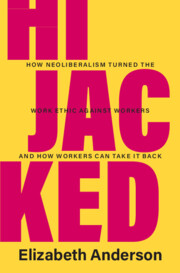Book contents
- Hijacked
- Hijacked
- Copyright page
- Contents
- Preface
- 1 The Dual Nature of the Protestant Work Ethic and the Birth of Utilitarianism
- 2 Locke and the Progressive Work Ethic
- 3 How Conservatives Hijacked the Work Ethic and Turned It Against Workers
- 4 Welfare Reform, Famine, and the Ideology of the Conservative Work Ethic
- 5 The Progressive Work Ethic (1): Smith, Ricardo, and Ricardian Socialists
- 6 The Progressive Work Ethic (2): J. S. Mill
- 7 The Progressive Work Ethic (3): Marx
- 8 Social Democracy as the Culmination of the Progressive Work Ethic
- 9 Hijacked Again: Neoliberalism as the Return of the Conservative Work Ethic
- 10 Conclusion: What Should the Work Ethic Mean for Us Today?
- Acknowledgments
- Major Works Cited
- Notes
- Index
- The Seeley Lectures
6 - The Progressive Work Ethic (2): J. S. Mill
Published online by Cambridge University Press: 21 September 2023
- Hijacked
- Hijacked
- Copyright page
- Contents
- Preface
- 1 The Dual Nature of the Protestant Work Ethic and the Birth of Utilitarianism
- 2 Locke and the Progressive Work Ethic
- 3 How Conservatives Hijacked the Work Ethic and Turned It Against Workers
- 4 Welfare Reform, Famine, and the Ideology of the Conservative Work Ethic
- 5 The Progressive Work Ethic (1): Smith, Ricardo, and Ricardian Socialists
- 6 The Progressive Work Ethic (2): J. S. Mill
- 7 The Progressive Work Ethic (3): Marx
- 8 Social Democracy as the Culmination of the Progressive Work Ethic
- 9 Hijacked Again: Neoliberalism as the Return of the Conservative Work Ethic
- 10 Conclusion: What Should the Work Ethic Mean for Us Today?
- Acknowledgments
- Major Works Cited
- Notes
- Index
- The Seeley Lectures
Summary
Since the late eighteenth century, European thinkers viewed history as a story of progress toward “civilization,” in which stages of progress are defined in terms of distinct modes of production. Societies progress by moving from hunter-gatherer subsistence, to herding, to settled agriculture, to civilized states with cities, manufacturing, commerce, arts, sciences, and law. These thinkers regarded Europe as ahead of “savage,” “barbarian,” and “semi-barbarian” societies in the rest of the world. This idea of European superiority in progress was reinforced in the nineteenth century by the spectacular economic growth spurred by astonishing technological innovations in manufacturing, transportation, and communication during the Industrial Revolution. European thinkers asked: what accounted for Europe’s rapid economic and technological progress, far ahead of the rest of the world?
- Type
- Chapter
- Information
- HijackedHow Neoliberalism Turned the Work Ethic against Workers and How Workers Can Take It Back, pp. 168 - 202Publisher: Cambridge University PressPrint publication year: 2023



